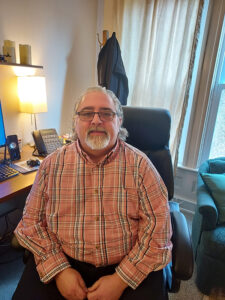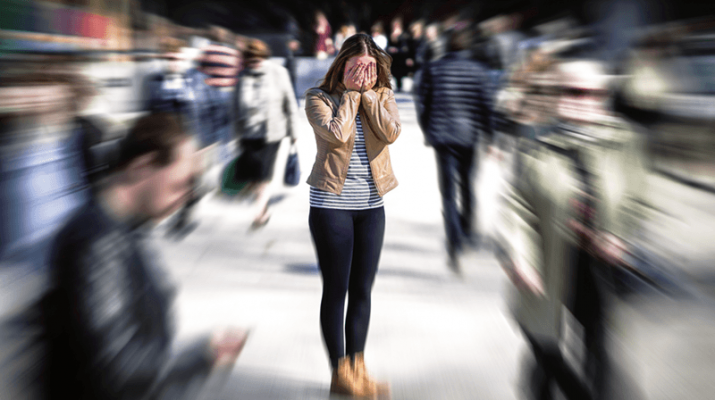By Barbara Pierce

Anxiety disorders are a range of serious medical conditions, the most common mental disorder in the U.S.
Women are twice as likely as men to be diagnosed with an anxiety disorder. It’s been identified as the No. 1 health concern for teens and young women.
Many of those dealing with anxiety find it difficult to get through the day, live in fear of daily activities and feel as if their anxiety dominates their lives. Some use drugs or alcohol to self-medicate. In such situations, seeking support from therapists Sacramento can provide valuable assistance in managing anxiety and developing healthier coping mechanisms.
We asked licensed mental health counselor James Davis, CEO of Samaritan Counseling Center in Utica to help us better understand anxiety.
1. People Are More Open to Discuss It
Q: How do you define anxiety? Is it becoming more common?
A: Anxiety is a part of life for all of us. It can be good or bad. Anxiety motives us to do what we need to do, avoid what we need to avoid. Most of us can cope with the anxiety we face. However, for some, it affects the quality of their life.
Since the pandemic, we’ve seen more people coming in with depression and anxiety. My guess as to why would be that we were all locked up for so long, it became scary for some to come back out, to get back into the world, have a normal life. Many of the clients we’re seeing now would have never come in before the pandemic. Now days, people are more open to talking about anxiety and depression.
2. It Affects How We Think
Q: How do I know if I’m experiencing anxiety?
A: Physically, you might have stomach issues or headaches; a feeling like a pit in your stomach and you don’t know why or trouble sleeping.
You may have cognitive issues, as anxiety affects how we think. You may have a sense of dread, a feeling that something needs to get done. You may have feelings of doom, worry, maybe you can’t put your finger on it. You’ll have worrisome thoughts. “What if…? (something bad you fear will happen). The “what if?” is always negative.
For some people, these symptoms come and go.
3. Financial Issues a Source of Anxiety
Q: What are the causes of anxiety?
A: When a person comes to us for help, we look at their family history, as there might be a genetic component. If your parents or grandparents had anxiety, you might also.
There’s an environmental component also. All sorts of things happen to us in life. For example, financial issues are most stressful for many; older people feel that they’re not valued in the workforce; relationship issues come up.
4. When to Seek Help
Q: How do I know when to see a professional for help?
A: If you feel like the quality of your life has changed, for example, your work is suffering or you can’t even work anymore, if you have social anxiety or a school phobia or panic attacks. If anxiety interferes with your daily life or is hard to control, start the process to deal with it.
5. Exercise Is Always Good
Q: How do you help people with anxiety? Is it effective?
A: We start where the client is at. (Their current state of being; what brought them in at this moment.) We educate them about how anxiety affects us, how what you’re feeling influences your thoughts and your behavior. For example, if you’re thinking “Nobody likes me,” you might isolate yourself because you feel sad about this. Then nobody checks up on you and that reinforces your feeling that nobody likes you.
Yes, therapy is effective. The St Charles therapist offers a holistic approach to guide you in your journey as you overcome your problem. If you’re working through a loss or going through a difficult transition in your life, therapy definitely helps. For generalized anxiety with no apparent trigger or cause, a combination of medication and talk therapy does help. Some of our clients don’t wish to take medication, and we do talk therapy and cognitive-behavioral therapy.
Several of the medications prescribed for depression work for anxiety, like Zoloft and Paxil. They take a while to build up in your system. As the drugs known as benzodiazepines have an addictive quality, doctors don’t usually prescribe them.
We also teach simple 4-7-8 breathing: Breathe in for four counts, hold for seven, let it out for eight. This works to regulate the amygdala. I teach it to kids all the time.
If people are avoiding a situation that triggers their anxiety, we help them work through this, with exposure to the situation while doing the breathing exercise.
Exercise is always good. It’s a great way to help your body relax. And having a support network is important; who do you trust?
Panic attacks are one form of anxiety that is especially disturbing. Really intense, they come out of nowhere. Your heart rate goes up, you may feel like you can’t breathe or feel like you’re going to die. You begin avoiding the situation that caused the attack, i.e. if it happened while you were driving, you may get anxious before getting into the car. Once you’ve had one, you fear it will happen again. We help people deal with it; labeling it as a panic attack helps.

